Principles of Economic Liberty: The Biblical Case for Free Enterprise
A Six-Session Bible Study Series Based on the Word Foundations Series of Articles Titled “The Bible and Free Enterprise”
“The Bible and Free Enterprise” is a Word Foundations series of articles that makes the case that the free enterprise economic model, or capitalism, is biblical. While free enterprise can be distorted and abused, the distortions are departures from biblical principles and a biblical worldview. Now more than ever, Christians must understand and be able to articulate that free enterprise, or capitalism, is rooted in biblical teachings and fosters qualities the Scripture commends. Not convinced? In this six-session series, you’ll encounter overwhelming evidence. The Bible is not silent about economic freedom!
Session 6
DIVINE GUARDRAILS
Only a virtuous people are capable of freedom. As nations become corrupt and vicious, they have more need of masters.
—Benjamin Franklin—
No truth is more evident to my mind than that the Christian religion must be the basis of any government intended to secure the rights and privileges of a free people.
—Noah Webster—
The principles covered in this session are highlighted in part 3 of “The Bible and Free Enterprise.”
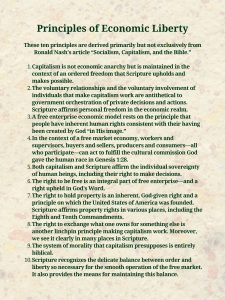
A PDF file of the above graphic is available here.
During this session we will examine principles 9 & 10 on our list.
-
-
- The system of morality that capitalism presupposes is entirely biblical.
- Scripture recognizes the delicate balance between order and liberty so necessary for the smooth operation of the free market. It also provides the means for maintaining this balance.
-

A PDF file of the above graphic is available here.
Law and Liberty
Use the the bolded portions in this section summarize these ideas presented below.
In a series of articles written and published at Word Foundations in July of 2019, readers were invited to explore “Principles of Liberty,” or ten biblical tenets embedded in the Declaration of Independence. Not quite a year later, a 5-session Bible study series debuted at Discover Bedrock Truth that explored these same principles in even greater depth. Here is the third principle from that ten-item list:
God and His laws establish the track on which men and nations must travel to attain happiness, fulfillment, and greatness; and to reach their God-given potential.

How can this be? The consensus of contemporary society is that laws are restrictive and oppressive. Yet the truth is that, properly understood and obeyed, they are not. Obeying God’s commands, loving Him, and serving Him actually are the keys to authentic freedom and happiness. A PDF file of this graphic is available here.
America’s Founders knew that men and women cannot live fulfilled lives merely by following their whims and desires, treading down whatever paths their raw appetites direct them. Rather, they must “assume among the powers of the earth, the separate and equal station to which the Laws of Nature and of Nature’s God entitle them.”
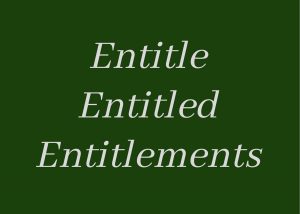 The word entitle is important. Entitle as the Founders used it is light years away from the meanings it and its various forms frequently carry today. How do we know this? Because according to the men who ratified the Declaration, that to which the people are entitled is granted and governed according to “the Laws of Nature and of Nature’s God.” By contrast, today, people look to government for everything to which they believe they are “entitled.” A PDF file of this graphic is available here.
The word entitle is important. Entitle as the Founders used it is light years away from the meanings it and its various forms frequently carry today. How do we know this? Because according to the men who ratified the Declaration, that to which the people are entitled is granted and governed according to “the Laws of Nature and of Nature’s God.” By contrast, today, people look to government for everything to which they believe they are “entitled.” A PDF file of this graphic is available here.
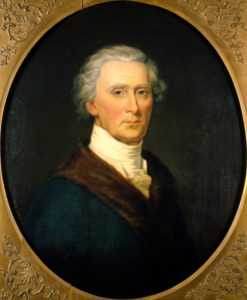
No, the parameters set by “the Laws of Nature and of Nature’s God” are not nearly as restrictive as they are liberating; yet sadly, as we have indicated, the idea that liberty and law go together is a foreign concept to Americans today. Not only are liberty and law compatible; they’re inseparable! How can a nation prosper? How can liberty thrive? Only under God!
Charles Carroll, [a] signer of the Declaration, declared, “Without morals a republic cannot subsist any length of time; they therefore who are decrying the Christian religion, whose morality is so sublime and pure (and) which insures to the good eternal happiness, are undermining the solid foundation of morals, the best security for the duration of free governments.”
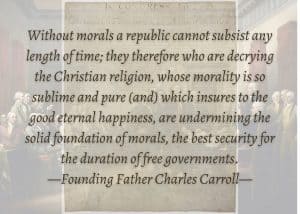
A PDF file of this graphic is available here.
Let me paraphrase Charles Carroll’s statement.
Those who are calling for more freedom by spurning the moral and ethical teachings of Scripture are undermining their own freedom. They are sawing off the very branch on which they are sitting!
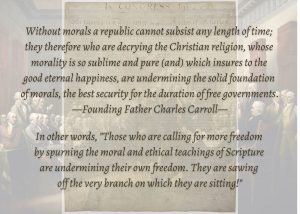
A PDF file of this graphic is available here.
Jedidiah Morse (1761-1826) became known as the “father of American geography.” He was an educator and the father of Samuel Morse, a painter, inventor, and telegraphy pioneer. The elder Morse observed,
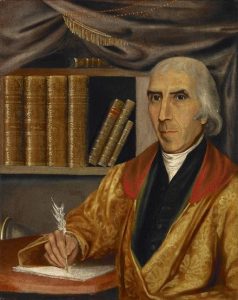
To the Kindly influence of Christianity we owe to that degree of civil freedom, and political and social happiness which mankind now enjoy. In proportion as the genuine effects of Christianity are diminished in any nation, either through unbelief, or the corruption of its doctrines, or the neglect of its institutions: in the same proportion will the people of that nation recede from the blessings of genuine freedom, and approximate the miseries of despotism. I hold this to be a truth confirmed by experience. If so, it follows, that all efforts made to destroy the foundations of our holy religion, ultimately tend to the subversion also of our political freedom and happiness. Whenever the pillars of Christianity shall be overthrown, our present republican forms of government, and all the blessings which flow from them, must fall with them.

A PDF file of this graphic is available here.
Other Founders and American leaders through the years agreed. Here are some of the principles on which our nation was founded and built. A typed copy is available here.
It’s like this. When driving, you can get where you need to go much faster and far more efficiently if you stay inside the lines that mark the lane of traffic in which you are supposed to travel.

Laws — especially God’s laws — are the guardrails that serve to keep you inside your lane.

Let’s examine some divine guardrails.
Principle Nine
The system of morality that capitalism presupposes is entirely biblical.
Ask participants to recall Deuteronomy 8:18, a passage the group studied during Session 2:
18 “And you shall remember the LORD your God, for it is He who gives you power to get wealth, that He may establish His covenant which He swore to your fathers, as it is this day.
Emphasize that on the heels of this statement, Moses says this to the Israelites:
19 Then it shall be, if you by any means forget the LORD your God, and follow other gods, and serve them and worship them, I testify against you this day that you shall surely perish. 20 As the nations which the LORD destroys before you, so you shall perish, because you would not be obedient to the voice of the LORD your God.
Rejecting Counterfeit Justice
Say: It isn’t just God’s anger over a nation’s disobedience that puts a nation in peril, but also the natural consequences of disobeying divine commands. Continue: There are two things to remember here.
-
-
-
- First, God is just, and naturally, He cares a great deal about justice. He wants His people to be just and righteous in all their dealings and relationships.
- Second, God has been clear about what justice looks like in economic transactions, human relationships, and government policies and actions.
-
-

A PDF of this graphic is available here.
Ask: What is justice? Discuss briefly. Use this definition of justice and contrast it to social justice.
Exercising and promoting justice means “rendering (1) impartially and (2) proportionally (3) to everyone his due (4) in accord with the righteous standard of God’s moral law.”
Additional information for this topic, including the clear definition of social justice we cited in Session 1, is available at “Justice Needs No Adjectives.”
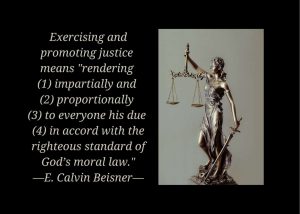
A PDF of this graphic is available here.
Emphasize that despite all the noble-sounding talk about justice today from social justice advocates, social justice and justice are two different things. Allie Stuckey expresses this idea well in the PragerU video “Social Justice Isn’t Justice.” She says, “Justice is getting what you deserve without favor. Social justice is getting what you don’t deserve because you are favored.”

A PDF of this graphic is available here.
Say: With this in mind, let’s examine some of the passages where God commands justice in economic tractions and in relationships in general. Choose between the following two options.
Option A
Ask participants to identify the references for the verses where the following are indicated. As members of your group share their answers, record their responses on the screen or board. Participants can easily access the passages on their phones by going to www.wordfoundations.com/guardrails.
Make sure this isn’t a discussion just about Bible references. Talk about the importance of the various items listed —
-
-
- why what God forbids should be avoided and
- why what He requires must be upheld.
-
Also, add to these items as necessary. No claim is made that these are exhaustive lists.
God forbids
-
-
- theft
- lying
- distortions of the truth
- coveting
- oppressive treatment of others
- partiality
- participating in a bribe
- joking about serious matters
- violence
-
God requires
-
-
- accurate measures in length, weight, and volume
- recognition of ancient landmarks
- humane treatment of foreigners, the poor, widows, and the fatherless
- integrity
- honesty
-
Option B
-
-
- Divide the class into six groups and give each group one of these assignment sheets.
- After groups have had a few minutes to discuss the items they have been assigned, ask groups to select one of their passages as a key or especially significant passage.
- Ask a volunteer spokesperson from each group to share the verse that was selected and why. Spokespersons may want to share some points made during the group discussions that helped group members select the key passage.
-
Just Weights and Measures
Continue: Briefly discuss the importance of accurate weights and measures in maintaining trust in economic transactions. Here are three informative videos from government agencies charged with ensuring accuracy in economic transactions where weights and measures are involved. One of the three is showcased below, but you can select one of the other two if you prefer.
Emphasize that the core issue with weights and measures is truth versus lies. Say: This is a conflict we’ll explore more thoroughly in just a few minutes. God hates lying. He is a God of truth and wants truth and integrity to prevail in human transactions and relationships. See these passages: Exodus 20:16; Deuteronomy 5:20; Psalm 86:15; Proverbs 6:16-19; 12:22; 13:5; John 17:17; Ephesians 4:14-15; Colossians 3:8-9; Titus 1:1-2. If time allows, read or have volunteers read one or more of these passages. If you can only read a few of these consider reading Exodus 20:16; Proverbs 6:16-19; Proverbs 12:22; Ephesians 4:14-15; and Colossians 3:8-9.
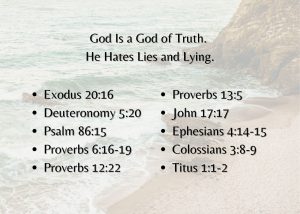
A PDF file of this graphic is available here.
Principle Ten
Scripture recognizes the delicate balance between order and liberty so necessary for the smooth operation of the free market. It also provides the means for maintaining this balance.
Say: In this important video, the late Harvard Business School professor Dr. Clay Christensen explains the connection between religious faith and freedom. In doing so, he also explains how people in a God-fearing country, because of their fear of God, resist using their freedoms to violate the rights of others.
Discuss Dr. Christensen’s brief presentation.
-
-
- Does it make sense? Explain.
- What challenges do Americans currently face as God and the things of God are being increasingly abandoned and rejected in our country?
-
Truth Versus Lies
Emphasize that truth and lies are in conflict over far more than weights and measures. In the current climate in America, if freedom is to be preserved, Christians and other people of good will must understand and uphold the truth, for lies are relentlessly attacking it. You see, at its most basic level, the pivotal battle being waged in the world today is one of Truth versus lies.

A PDF file of this graphic is available here.
Lies Manipulate; Truth Has no Agenda
 In 1977, Christian philosopher Dr. Francis Schaeffer produced a film series titled How Should We Then Live? It was based on Schaeffer’s 1976 book by the same name. In both the book and the film series, Schaeffer traces “The Rise and Decline of Western Thought and Culture” from the age of the Roman Empire to the 20th century. Against this historical backdrop, Dr. Schaeffer makes biblical recommendations on how believers can best address modern problems. It is difficult to swim against the cultural tide, but believers must do so, lest lies prevail when truth is so desperately needed.
In 1977, Christian philosopher Dr. Francis Schaeffer produced a film series titled How Should We Then Live? It was based on Schaeffer’s 1976 book by the same name. In both the book and the film series, Schaeffer traces “The Rise and Decline of Western Thought and Culture” from the age of the Roman Empire to the 20th century. Against this historical backdrop, Dr. Schaeffer makes biblical recommendations on how believers can best address modern problems. It is difficult to swim against the cultural tide, but believers must do so, lest lies prevail when truth is so desperately needed.
Lies abound today! Even in the late 1970s, Dr. Schaeffer saw this. Watch his portrayal of the power of the media to slant a story in one direction or another, to influence the thinking and perspectives of the masses. This clip from the film series is just over three-and-a-half minutes long. Background: Here is expanded clip from the same film (part 10 of 10 parts) in the series.
Play this video for your participants. It comes from the tenth film in the series.
Oh, if only Dr. Schaeffer could see what we’re dealing with now! What we have now is the kind of manipulation Dr. Schaeffer described in How Shall We Then Live? on steroids.
A Clash of Worldviews
Just a couple of years before he died, Dr. Schaeffer spoke at the Coral Ridge Presbyterian Church in Fort Lauderdale, Florida. He presented the heart of the content of his bestselling book A Christian Manifesto. You can hear the entire presentation here.
Say: For our purposes here, Dr. Schaeffer offers us two clips that are about two-and-a-half minutes each. Use these to cover the material.
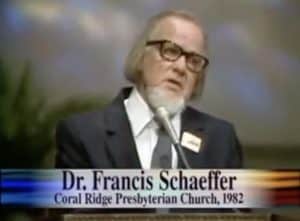
A printed copy of the material for clip #1 is available here.
A printed copy of the material for clip #2 is available here.
Conclusion: Returning to the Place at Which We Started
Thus, we have come full circle, emphasizing the point we emphasized at the beginning: The battle for freedom over tyranny and for capitalism over socialism is a clash between worldviews. To engage effectively in this battle, we must understand and contend for the worldview that aligns with reality, or truth. That worldview is the biblical worldview.
Speak the Truth and Resist Tyranny

Even though this series of studies has been based on Scripture (it has been, after all, a Bible study), one paragraph in an article about capitalism written by Dr. Ronald Nash has given us a “roadmap” for the study. Yet the entire article is worthy of our attention, and I hope and trust you will read it attentively.
Here, at the conclusion of our study, we do well to consider what Dr. Nash wrote at the conclusion of his article. Recognizing the alignment between Scripture and the principles that make capitalism work, Dr. Nash made some important observations:
Little can be done to prevent human beings from wanting to be rich. But what capitalism does is channel that desire into peaceful means that benefit many besides those who wish to improve their own situation.
Which choice then should I, as a Christian, make in the selection between capitalism and socialism? Capitalism is quite simply the most moral system, the most effective system, and the most equitable system of economic exchange. When capitalism, the system of free economic exchange, is described fairly, there can be no question that it, rather than socialism or interventionism, comes closer to matching the demands of the biblical ethic.
Capitalism is quite simply the most moral system, the most effective system, and the most equitable system of economic exchange. When capitalism, the system of free economic exchange, is described fairly, there can be no question that it, rather than socialism or interventionism, comes closer to matching the demands of the biblical ethic.
—Ronald Nash—
I’ll go even further than Dr. Nash. While capitalism has its imperfections, the free enterprise model as he described it doesn’t merely align with biblical truth.
It rests on it.
The free enterprise model of economic exchange doesn’t merely align with biblical truth. It rests on it.
Let’s not be shy about our convictions regarding free enterprise. Let’s be quick to uphold it and its supporting principles, including the freedom it affirms. Further, let’s resist every attempt to overthrow it.
Nothing less than liberty is at stake.
Copyright © 2021 by B. Nathaniel Sullivan. All rights reserved.
image credit: Dr. Ronald Nash
top image credit: Photo by AbsolutVision on Unsplash
